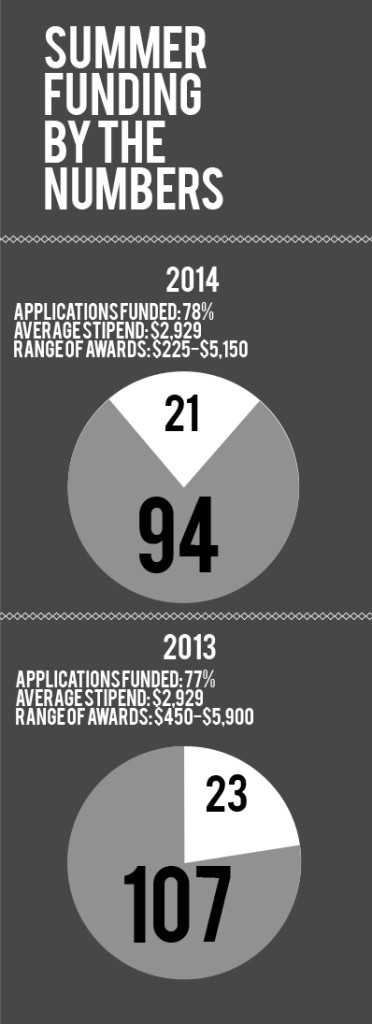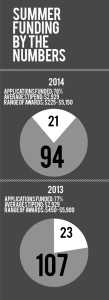At 4 p.m. on a day in early April, Melissa Fandos ’17 scrambled to find a way to finance her summer internship. After being accepted to work with a Chicago media company called Facets Multi-Media the same day summer funding applications were due, she appealed to the Center for Careers, Life and Service (CLS) for an extension on her application. The CLS enforced their no exceptions policy, leaving her out of luck.
This is the unfortunate fate for many students as they work to solidify their summer plans. While the CLS has provided funding for many students, they are working to improve the system and help even more Grinnellians fund their unpaid internships.
This summer, the CLS will be undergoing an internal audit of their summer internship funding application process to try to further improve their ability to support students gaining valuable work experience in their intended career fields.
Summer internship funding from the College is competitive, but significant—the CLS was able to provide summer funding for 78 percent of applicants in 2014 and 77 percent in 2013. According to Director of Career Counseling and Exploration Megan Crawford, Grinnell gives much more internship funding than its peer institutions and it has been a priority for the College for a number of years.
The application is due in early April—this year it was April 6—and must include a resume, an unofficial transcript, proof of acceptance from an internship supervisor, a carefully researched proposed budget, two faculty recommendations and answers to several short answer questions regarding the organization, intern duties or projects, its significance for future careers and qualifications for the position. Applicants must choose one of the many different internship funds, whose specific missions are each detailed on the CLS website. One of the most overlooked but important steps of applying for funding is meeting with a CLS staff member to decide the appropriate funding source for applicants.
“Some funding sources have more funding than others, so one drawback to this system is that if a student interested in internship funding doesn’t come to the CLS to inquire about the best fit for their internship experience, a student may not apply to the funding source that would have the highest probability of being chosen for funding,” Crawford wrote in an email to The S&B.
Each funding source has a College staff or faculty member who acts as chair and leads the selection and approval process, which varies slightly between sources. Committees carefully consider each application, according to Professor Janet Davis, Computer Science, and current director of the Wilson Program in Enterprise and Leadership. The review board committees look for qualified applicants whose internships match the fund’s mission, have well-defined descriptions and supervisor leadership and fit with the student’s career goals.
“Knowing the internship supervisor thinks the student is qualified, of course, makes a big difference,” Davis said.
The application process is divided into individual funds because the money comes from distinctly separate endowments with unique intentions.
“This is money that comes from endowments that were founded by one particular donor who had a vision of how they wanted their money spent. The College wants to spend this money in the way that the donor wanted it to be spent. The first priority is internships that fit the mission of that particular program,” Davis said. “I’m actually pretty impressed that Grinnell has a pretty diverse set of different internship programs.”
Like Fandos, many students have taken issue with the application due date and notification of decision date. Some, who receive acceptance from their organization as early as November or January, feel it is too late to be able to commit to an unpaid position that may not be possible without College funding. Others, who may not hear from their organization until mid-April or the beginning of May, find it is too early and miss the opportunity to apply.
According to Crawford, the date is chosen based on the amount of time it takes to review applications, conduct interviews, make decisions, facilitate orientation sessions and other necessary steps before the last week of classes—generally about four to five weeks.
“Most students don’t realize the extensive backroom operations that are necessary to orchestrate this whole process. Additionally, there is not enough money for every student to receive funding, which is why it is a competitive process,” Crawford wrote. “With that in mind, there will always be students unable to secure internship funding regardless of the deadline.”
Although Fandos was set back by her inability to apply for funding, she understands the CLS’ no-exceptions policy.
“It makes sense, but it’s frustrating,” she said.
With the assistance of her family, Fandos was still able to participate in her internship, but this is not an option for all students.
“Luckily, I’ve had a job since I was like 14, so I have a lot saved, so I paid for my food and transportation with my savings and then my parents paid for my housing,” Fandos explained. “I was fortunate to have that, but it wasn’t ideal. It was a bummer.”
Fandos is an English major looking to work in film production. Because Grinnell does not have a full film department, and the film classes focus on theory, this internship provided important work experience for Fandos. She is excited to be working another film production internship this summer, this time secured through Grinnellink opportunities, successfully before the funding application deadline. Fandos sees student difficulties with the summer internship process coming from a number of different angles.
“It’s partly the companies’ fault as well, because if they’re not letting you know until May, how are you supposed to find housing and everything in a matter of weeks? I think the whole internship system needs to change a little bit,” she said. “And maybe internships could be paid, and there wouldn’t be this issue. But it’s awesome that Grinnell tries to help you out so you can gain the experience necessary to get a job.”






























































